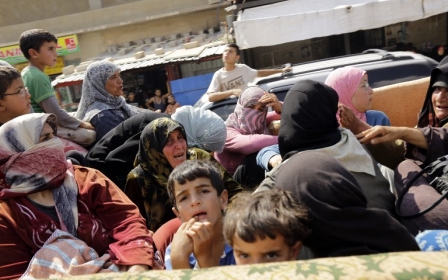Lebanese army battles mystery militants near Syrian border

Lebanese troops clashed with unidentified gunmen Thursday in a majority Sunni Muslim area near the Syrian border which witnessed deadly clashes between Syrian militants and the Lebanese Army three weeks ago.
"Gunmen fired on an army checkpoint in the Arsal area before dawn, without causing any casualties," a security official said.
"The army has responded with artillery and Grad missiles," the official added.
The overnight shelling is the first confrontation between the Army and gunmen since militnat groups retreated from Arsal following five days of violent clashes earlier this month.
Although previously militants on the Lebanese-Syrian borders were identified as members of the Islamic State or the al-Nusra Front, sources say the identity of the militants involved in Thursday’s clashes is unknown.
“The militants who clashed with the Lebanese Army previously are not the same ones who are clashing with the troops today. They are Syrians but not necessarily from the known rebel groups,” said Hussam Al-Ghali, a member of a delegation of Sunni scholars which had been mediating between the Army and the militants to reach a ceasefire.
Renewed fighting after retreat
Hezbollah fired rockets from near the Bekaa Valley town of Labweh onto the same militant positions overnight, reported The Daily Star.
Heavy clashes also broke out after midnight between Hezbollah fighters, who are backed by Syrian government forces, and rebels, the Lebanese newspaper reported.
The involvement of Hezbollah has raised concerns about the renewal of a sectarian conflict which previously tore the country apart during the brutal 25-year civil war.
The overnight shelling is the first confrontation between the Army and militants after the militants retreated from Arsal following five days of deadly clashes earlier this month.
The Arsal area is a mainly Sunni enclave within Lebanon's largely Shiite Bekaa Valley region which hosted tens of thousands of Sunni refugees from neighbouring Syria, until they were forced to flee back to Syria amid the clashes.
The area's locals are overwhelmingly sympathetic to the more than three-year-old Sunni-dominated uprising against President Bashar al-Assad's government and are widely suspected of smuggling both weapons and fighters across the border.
Arsal's violence erupted on 2 August when the Lebanese army arrested Imad Ahmad Jomaa, a rebel commander who had recently sworn allegiance to the Islamic State (IS), at a checkpoint.
During several days of fighting that followed, 19 soldiers, 16 civilians and dozens of militants were killed.
The fighting ended with a short-lived truce negotiated by Lebanese Sunni clerics, but the militants withdrew from the area taking 24 police and soldiers hostage.
“We [the delegation] stopped negotiating after failing to bring the two sides together a week ago – both sides have irreconcilable demands and neither wants to compromise,” said Ghali, the Sunni scholar.
Extending influence into Lebanon?
Demands from the fighters include the withdrawal of Hezbollah from the war in Syria, the release of prisoners from Beirut's Roumieh prison, and better treatment for Syrian refugees inside Lebanon. The 23 August video released by Nusra Front underlined the demands and increased local concern.
However analysts say the violence could have been initiated by Islamic State members among the militants who wish to extend IS’s sphere of influence into Lebanon.
“Sunni Salafis are feeling enormously empowered by their capacity to expand and occupy territory from Iraq to Syria which has given them an incentive to look into Lebanon as a potential aspect of their expansion strategy,” said Fillippo Dionigi, a research fellow at the London School of Economics Middle East Centre.
Other analysts say that the violence witnessed on the Lebanese-Syrian borders are specifically linked to the Syria war.
Emile Hokayem, a senior fellow for regional security at the International Institute for Strategic Studies, said earlier this month the situation in Arsal was an inevitable "spill over" from the Syrian conflict.
"As much as the Lebanese like to think that Syria's problems are coming to Lebanon, the reality is that Lebanon sent fighters for and against Assad to Syria... so we shouldn't be surprised that it's coming here,” said Hokayem.
While Lebanon has officially sought to distance itself from the conflict in neighbouring Syria, espousing a policy of "dissociation", the Shiite Hezbollah movement has openly intervened in the Syrian conflict, dispatching fighters to bolster regime troops against the Sunni-dominated uprising.
Stay informed with MEE's newsletters
Sign up to get the latest alerts, insights and analysis, starting with Turkey Unpacked
Middle East Eye delivers independent and unrivalled coverage and analysis of the Middle East, North Africa and beyond. To learn more about republishing this content and the associated fees, please fill out this form. More about MEE can be found here.




